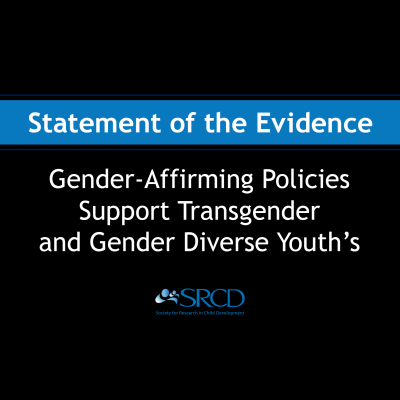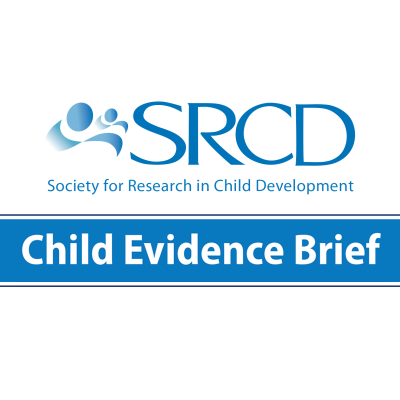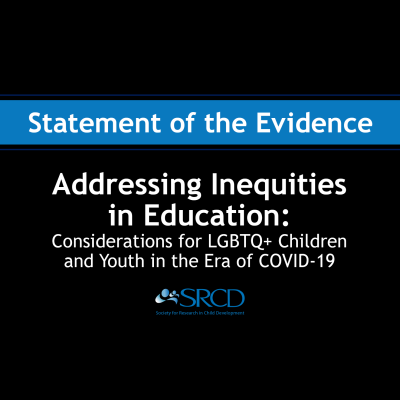Evidence-Based Curricula and Job-Embedded Coaching for Teachers Promote Preschoolers’ Learning
Edited by Rebekah Levine Coley, Ph.D., Boston College. For more information, contact Kelly R. Fisher, Ph.D., Director for Policy, Society for Research in Child Development, at policy@srcd.org.
Authors
- Christina Weiland, Ed.D., University of Michigan
- Hirokazu Yoshikawa, Ph.D., New York University
Preschool helps prepare children for kindergarten and can promote their long-term health, educational outcomes, and career success.1 Evidence-based2 curricula and job-embedded, curriculum-based coaching for teachers3 are critical tools for delivering on the promise of universal preschool in the United States. The Biden Administration’s American Families Plan, which aims to offer universal preschool to all three- and four-year-old children, specifies that universal preschool programs must use “developmentally appropriate” curricula and provide regular “job-embedded coaching” for teachers.4 Rigorous evidence shows that some preschool curricula promote learning more powerfully than others, particularly when paired with regular job-embedded coaching.3,5-7 However, most public preschool programs currently use curricula that are not evidence-based – that is, have not been shown to be effective using the most rigorous scientific methods with recent cohorts of children.8 Many offer no coaching or, if they do, do not embed on-the-job coaching in classrooms and tie it directly to evidence-based curricula. To promote children’s learning, narrow inequities in learning opportunities, and maximize positive impacts of preschool investments, it is critical that universal preschool programs follow the best science of early learning and use evidence-based curricula and job-embedded, curriculum-based coaching for teachers.
Preschoolers Learn More in Classrooms That Use Evidence-Based Curricula
Rigorous research shows that the best preschool curricula are developmentally appropriate – they have a scope and sequence that matches how young children learn; are play-based, fun, and engaging for children; and can be implemented by teachers in real-world settings.
- Rigorous studies have found that preschool curricula focused on one domain of learning – math, language, literacy, or social-emotional skills – produce larger learning gains for children than all-purpose curricula designed to teach all domains at once.9-22 The What Works Clearinghouse, within the U.S. Department of Education’s Institute of Education Sciences, maintains a list of these effective, domain-specific curricula. Presently, there is no single evidence-based preschool curriculum that covers all important learning areas.
- Localities have had success in combining evidence-based, domain-specific curricula to create a more holistic curriculum.9,23 For example, a curriculum project in Pennsylvania combined language, literacy, and social- emotional curricula and found evidence of lasting benefits for social and academic learning and parent involvement compared to an all-purpose curriculum.24
- Children from families with low incomes, children of color, and dual language learners benefit from evidence-based curricula just as much or even more than their peers.23,25-28 Thus, evidence-based curricula are a tool for promoting equity and narrowing disparities in learning opportunities that have been shown in national studies of preschool quality.6,29
To promote children’s learning, narrow inequities in learning opportunities, and maximize positive impacts of preschool investments, it is critical that universal preschool programs follow the best science of early learning and use evidence-based curricula and job-embedded, curriculum-based coaching for teachers.
Job-Embedded, Curriculum-Based Coaching for Teachers Promotes Instructional Quality and Children’s Learning
- Job-embedded coaching is professional development with direct observation of practice, implemented in the everyday work setting of the classroom. A well-trained coach comes regularly to the teacher’s classroom to observe and provide support and feedback on curricula implementation as well as classroom organization, daily schedules, and behavior management. Job-embedded coaching is a successful approach in improving instructional quality and children’s learning gains in preschool.30
- Rigorous evaluations show that coaching that supports domain-specific curricula is more successful in improving preschool children’s learning than coaching on general best practices for preschool teaching.9, 11, 16, 18, 21, 23, 30-33
- Adopting evidence-based curricula and curriculum-based coaching has been shown to be financially feasible in large-scale preschool programs. A rigorous cost study of Boston’s Prekindergarten program found that these elements were a relatively small portion of per-child spending.34 Providing further evidence of feasibility, job-embedded coaching was implemented as an improvement strategy in 16 out of 18 states awarded federal Preschool Development Grants in 2014.35
Most Public Preschool Programs Do Not Use Evidence-Based Curricula or Support Teachers with Job-Embedded Coaching
Most public preschool programs are not implementing evidence-based curricula or curriculum-based, job-embedded coaching for teachers.
- In 2017, 86% of Head Start programs reported using one of two general all-purpose curricula – Creative Curriculum or HighScope – that are less effective than domain-specific alternatives.14,19,36 Available data on state-funded public preschool programs find most programs also use less effective, all-purpose curricula.8,19,37
- Regulations matter for curriculum choices. Many states require preschool programs to choose curricula from a pre-approved list. Some states’ lists only or mostly include curricula that are not evidence-based.38
- A 2020 report on all state-funded preschool programs found that only 14 out of 62 required job-embedded coaching for public preschool teachers.39
There are a Number of Ways Policies, Regulations, and Research Can Improve Preschool Quality
Effective policies – at federal, state, and local levels – are critical to ensuring that universal preschool expansions are based in the best science of early learning and effective preschool practices. Regulations can:
- Build on existing efforts to further incentivize programs to use effective instructional tools, including pairing job-embedded coaching with evidence-based curricula. Such incentives could be provided at the federal level or state level. For example, federal legislation required home visiting programs to use evidence-based models.40 At the state level, Massachusetts is currently piloting the use of state and federal grant funds to support public and private preschool programs in identifying and adopting evidence-based curricula.41
- Provide additional incentives and guidance to combine evidence-based curricula in different learning domains (i.e., literacy and social-emotional curricula).
- Ensure broad access to the best scientific evidence on effective preschool curricula by updating and expanding the What Works Clearinghouse.42
- Build evidence on critical issues in the field, such as needs for effective, sequenced curricula for three- and four-year-olds; coaching models that succeed in virtual-only as well as mixed in-person and virtual modalities; and curricula for diverse populations that directly reduce racial and other inequities.
Following the best science of early learning is critical for delivering on the promise of universal preschool for young children. This science can be connected to policy and practice in ways that help put all children on a path towards success in kindergarten and beyond.
Endnotes/References
(1) Yoshikawa, H., Weiland, C., & Brooks-Gunn, J. (2016). When does preschool matter?. The Future of Children, 21-35.
(2) We define evidence-based as supported by studies using quasi-experimental or experimental methods. The What Works Clearinghouse reviews and rates curricula according to this metric.
(3) Yoshikawa, H., Weiland, C., Brooks-Gunn, J., Burchinal, M., Espinosa, L., Gormley, W., Ludwig, J.O., Magnuson, K.A., Phillips, D.A., & Zaslow, M.J. (2013). Investing in our future: The evidence base on preschool education. New York: Foundation for Child Development and Ann Arbor, MI: Society for Research in Child Development.
(4) White House. (2021, April 28). Fact sheet: The American Families Plan. https://www.whitehouse.gov/briefing-room/statements-releases/2021/04/28/fact-sheet-the-american-families-plan/
(5) Bierman, K. (2021). 50 years of research to improve preschool curricula: Is there progress? Child Development. https://monographmatters.srcd.org/2021/02/16/commentary-bierman-86-1/.
(6) Chaudry, A., Morrissey, T., Weiland, C., & Yoshikawa, H. (2021). Cradle to kindergarten: A new plan to combat inequality. New York, NY: Russell Sage Foundation.
(7) Phillips, D., Lipsey, M., Dodge, K.A., Haskins, R., Bassok, D., Burchinal, M.R., Duncan, G.J., Dynarski, M., Magnuson, K.A., & Weiland, C. (2017). Puzzling it out: The current state of scientific knowledge on pre-kindergarten effects. Washington, DC: Brookings Institution. https://www.brookings.edu/wp-content/uploads/2017/04/consensus-statement_final.pdf
(8) Jenkins, J. M., & Duncan, G. J. (2017). Do pre-kindergarten curricula matter? In D. Phillips, K. A. Dodge & Pre-Kindergarten Task Force (Eds.), The current state of scientific knowledge on pre-kindergarten effects (pp. 37–44). Washington, DC: Brookings Institution and Duke University.
(9) Bierman, K. L., Domitrovich, C. E., Nix, R. L., Gest, S. D., Welsh, J. A., Greenberg, M. T., ... & Gill, S. (2008). Promoting academic and social‐emotional school readiness: The Head Start REDI program. Child development, 79(6), 1802-1817.
(10) Clements, D. H., & Sarama, J. (2007). Effects of a preschool mathematics curriculum: Summative research on the Building Blocks project. Journal for Research in Mathematics Education, 38, 136-163;
(11) Clements, D. H., Sarama, J., Spitler, M. E., Lange, A. A., & Wolfe, C. B. (2011). Mathematics learned by young children in an intervention based on learning trajectories: A large-scale cluster randomized trial. Journal for Research in Mathematics Education, 42(2), 127-166.;
(12) Farver, J. M., Lonigan, C. J., & Eppe, S. (2009). Effective early literacy skill development for young Spanish-speaking English language learners: An experimental study of two methods. Child Development, 80, 703-719.
(13) Hsueh, J., Lowenstein, A. E., Morris, P., Mattera, S. K., & Bangser, M. (2014). Impacts of social-emotional curricula on three-year-olds: Exploratory findings from the Head Start CARES Demonstration. OPRE; Report 2014-78. Administration for Children & Families.
(14) Jenkins, J. M., Duncan, G. J., Auger, A., Bitler, M., Domina, T., & Burchinal, M. (2018). Boosting school readiness: Should preschool teachers target skills or the whole child? Economics of Education Review, 65, 107-125.
(15) Lonigan, C. J., Farver, J. M., Phillips, B. M., & Clancy-Menchetti, J. (2011). Promoting the development of preschool children’s emergent literacy skills: A randomized evaluation of a literacy-focused curriculum and two professional development models. Reading and Writing, 24, 305-337.
(16) Mattera, S., Jacob, R., & Morris, P. (2018). Strengthening children's math skills with enhanced instruction: The impacts of Making Pre-K Count and High 5s on kindergarten outcomes. New York: MDRC.
(17) Mattera, S., Rojas, N. M., Morris, P. A., & Bierman, K. (2021). Promoting EF with preschool interventions: Lessons learned from 15 years of conducting large-scale studies. Frontiers in Psychology, 12, 640702.
(18) Morris, P., Mattera, S., Castells, N., Bangser, M., Bierman, K., & Raver, C. C. (2014). Impact findings from the Head Start CARES Demonstration: National evaluation of three approaches to improving preschoolers' social and emotional competence. Washington, DC: OPRE Report.
(19) Nguyen, T., Jenkins, J. M., & Auger Whitaker, A. (2018). Are content-specific curricula differentially effective in Head Start or state prekindergarten classrooms? AERA Open, 4(2), 1-17.
(20) Preschool Curriculum Evaluation Research Consortium (2008). Effects of preschool curriculum programs on school readiness (NCER 2008-2009). Washington, DC: National Center for Education Research, Institute of Education Sciences, U.S. Department of Education. Washington, DC: U.S. Government Printing Office.
(21) Raver, C. C., Jones, S. M., Li-Grining, C. P., Zhai, F., Metzger, M., & Solomon, B. (2009). Targeting children’s behavior problems in preschool classrooms: A cluster-randomized controlled trial. Journal of Consulting and Clinical Psychology, 77, 302–316.
(22) Sarama, J., Lange, A. A., Clements, D. H., & Wolfe, C. B. (2012). The impacts of an early mathematics curriculum on oral language and literacy. Early Childhood Research Quarterly, 27(3), 489-502.
(23) Weiland, C., & Yoshikawa, H. (2013). Impacts of a prekindergarten program on children's mathematics, language, literacy, executive function, and emotional skills. Child Development, 84(6), 2112-2130.
(24) Welsh, J. A., Bierman, K. L., Nix, R. L., & Heinrichs, B. N. (2020). Sustained effects of a school readiness intervention: 5th grade outcomes of the Head Start REDI program. Early Childhood Research Quarterly, 53, 151-160.
(25) Dumas, D., McNeish, D., Sarama, J., & Clements, D. (2019). Preschool mathematics intervention can significantly improve student learning trajectories through elementary school. AERA Open, 5(4), 1-15.
(26) Foster, M. E., Anthony, J. L., Clements, D. H., Sarama, J., & Williams, J. J. (2018). Hispanic dual language learning kindergarten students' response to a numeracy intervention: A randomized control trial. Early Childhood Research Quarterly, 43, 83-95.
(27) Goodrich, J. M., Lonigan, C. J., & Farver, J. A. M. (2017). Impacts of a literacy-focused preschool curriculum on the early literacy skills of language-minority children. Early Childhood Research Quarterly, 40, 13-24.
(28) Starkey, P., Klein, A., & Wakeley, A. (2004). Enhancing young children’s mathematical knowledge through a pre-kindergarten mathematics intervention. Early Childhood Research Quarterly, 19(1), 99-120.
(29) Flood, S., McMurry, J.F.S., Sojourner, A., & Wiswall, M. (2021). Inequality in early care experienced by U.S. children. Cambridge, MA: NBER Working Paper. https://www.nber.org/papers/w29249
(30) Kraft, M. A., Blazar, D., & Hogan, D. (2018). The effect of teacher coaching on instruction and achievement: A meta-analysis of the causal evidence. Review of Educational Research, 88(4), 547-588.
(31) Pianta, R., Hamre, B., Downer, J., Burchinal, M., Williford, A., Locasale-Crouch, J., ... & Scott-Little, C. (2017). Early childhood professional development: Coaching and coursework effects on indicators of children’s school readiness. Early Education and Development, 28(8), 956-975.
(32) Piasta, S. B., Farley, K. S., Mauck, S. A., Soto Ramirez, P., Schachter, R. E., O'Connell, A. A., ... & Weber-Mayrer, M. (2020). At-scale, state-sponsored language and literacy professional development: Impacts on early childhood classroom practices and children’s outcomes. Journal of Educational Psychology, 112(2), 329–343.
(33) Note that coaching tied to preschool curricula that do not have a strong evidence base do not improve children’s learning (AIR. (2019). HighScope preschool curriculum and professional development efficacy study: Results in brief. Washington, DC: AIR).
(34) Kabay, S., Weiland, C., & Yoshikawa, H. (2020). Costs of the Boston Public Prekindergarten Program. Journal of Research on Educational Effectiveness, 13(4), 574-600.
(35) U.S. Department of Education. (2019). Starting strong: Increasing preschool quality and access. https://www2.ed.gov/programs/preschooldevelopmentgrants/pdg-summary-rpt-final-12202019.pdf
(36) Bernstein, S., Bush, C., Aikens, N.,Moiduddin, E., Harding, J.F., Malone, L., Tarullo, L., Cannon, J., Filipczak, K., & Lukashanets, S. (2018). A portrait of Head Start classrooms and programs: FACES Spring 2017 data tables and study design. OPRE Report 2019-10. Washington, DC: Office of Planning, Research, and Evaluation, Administration for Children and Families, U.S. Department of Health and Human Services. https://www.acf.hhs.gov/sites/default/files/documents/opre/faces_spring_2017_data_tables_and_study_design_508.pdf.
(37) Early, D., Barbarin, O., Bryant, B., Burchinal, M., Chang, F., Clifford, R., . . . Weaver, W. (2005). Pre-kindergarten in eleven states: NCEDL’s Multi-State Study of Pre-Kindergarten and State-Wide Early Education Programs (SWEEP) study. Retrieved from http://fpg.unc.edu/sites/fpg.unc.edu/files/resources/reportsand-policy-briefs/NCEDL_PreK-in-Eleven-States_WorkingPaper_2005.pdf.
(38) Friedman-Krauss, A. H., Barnett, W. S., Garver, K. A., Hodges, K. S., Weisenfeld, G., & DiCrecchio, N. (2019). The state of preschool 2018: State preschool yearbook. New Brunswick, NJ: National Institute for Early Education Research.
(39) Friedman-Krauss, A. H., Barnett, W. S., Garver, K. A., Hodges, K. S., Weisenfeld, G. G. & Gardiner, B. A. (2021). The state of preschool 2020: State preschool yearbook. New Brunswick, NJ: National Institute for Early Education Research.
(40) U.S. Department of Health and Human Services. (n.d.) Models eligible for Material, Infant, and Early Childhood Home Visiting (MIECHV) funding. https://homvee.acf.hhs.gov/HRSA-Models-Eligible-MIECHV-Grantees
(41) Personal Communication, Jocelyn Bowne, October 25, 2021.
(42) By expanding WWC ratings, we mean assuring the WWC includes easily-accessible information on what a tested curricula was compared to and effects for important student subgroups (i.e., racial/ethnic groups, dual language learners, children from families with low incomes).


